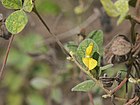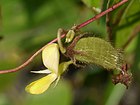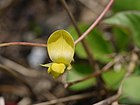Note: This is a project under development. The articles on this wiki are just being initiated and broadly incomplete. You can Help creating new pages.
Cajanus scarabaeoides
Cajanus scarabaeoides is an annual to perennial climbing plant. The slender stems scramble over the ground, twinging into the surrounding vegetation for support. The plant can form thick mats of growth over the ground.
Contents
[hide]- 1 Uses
- 2 Parts Used
- 3 Chemical Composition
- 4 Common names
- 5 Properties
- 6 Habit
- 7 Identification
- 8 List of Ayurvedic medicine in which the herb is used
- 9 Where to get the saplings
- 10 Mode of Propagation
- 11 How to plant/cultivate
- 12 Commonly seen growing in areas
- 13 Photo Gallery
- 14 References
- 15 External Links
Uses
Swelling of leg, Pain of leg, Night fevers, Renal stones, Eye diseases, Dropsy, Anaemia, Hemiplegia, Burns, Small-pox, Syphilis, Gonorrhoea, Spermatorrhoea, Gravel, Cholera.
Parts Used
Chemical Composition
Raw seeds of tribal pulses Atylosia scarabaeoides, Canavalia gladiata, Lablab purpureus var. lignosus, Neonotonia wightii var.[1]
Common names
| Language | Common name |
|---|---|
| Kannada | |
| Hindi | |
| Malayalam | |
| Tamil | |
| Telugu | |
| Marathi | |
| Gujarathi | |
| Punjabi | |
| Kashmiri | |
| Sanskrit | |
| English | Showy Pigeonpea, Peanut grass |
Properties
Reference: Dravya - Substance, Rasa - Taste, Guna - Qualities, Veerya - Potency, Vipaka - Post-digesion effect, Karma - Pharmacological activity, Prabhava - Therepeutics.
Dravya
Rasa
Guna
Veerya
Vipaka
Karma
Prabhava
Habit
Identification
Leaf
| Kind | Shape | Feature |
|---|---|---|
Flower
| Type | Size | Color and composition | Stamen | More information |
|---|---|---|---|---|
| {{{5}}} |
Fruit
| Type | Size | Mass | Appearance | Seeds | More information |
|---|---|---|---|---|---|
Other features
List of Ayurvedic medicine in which the herb is used
Where to get the saplings
Mode of Propagation
How to plant/cultivate
Requires a sunny position. The var scarabaeoides is found in the wild on heavy soils, whilst var pedunculata is found on sandy, lateritic soils.[3]
Commonly seen growing in areas
Fields, Roadsides, Grassy slopes, Seasides, Open grassland, Dry scrub, Deciduous monsoon forests.
Photo Gallery
References
- Jump up ↑ Chemical constituents
- Jump up ↑ [Morphology]
- Jump up ↑ Cultivation
External Links
- Ayurvedic Herbs known to be helpful to treat Swelling of leg
- Ayurvedic Herbs known to be helpful to treat Pain of leg
- Ayurvedic Herbs known to be helpful to treat Night fevers
- Ayurvedic Herbs known to be helpful to treat Renal stones
- Ayurvedic Herbs known to be helpful to treat Eye diseases
- Ayurvedic Herbs known to be helpful to treat Dropsy
- Ayurvedic Herbs known to be helpful to treat Anaemia
- Ayurvedic Herbs known to be helpful to treat Hemiplegia
- Ayurvedic Herbs known to be helpful to treat Burns
- Ayurvedic Herbs known to be helpful to treat Small-pox
- Ayurvedic Herbs known to be helpful to treat Syphilis
- Ayurvedic Herbs known to be helpful to treat Gonorrhoea
- Ayurvedic Herbs known to be helpful to treat Spermatorrhoea
- Ayurvedic Herbs known to be helpful to treat Gravel
- Ayurvedic Herbs known to be helpful to treat Cholera
- Herbs with Young seedpods used in medicine
- Herbs with Seeds used in medicine
- Herbs with common name in English
- Habit - Perennial Climber
- Index of Plants which can be propagated by Seeds
- Herbs that are commonly seen in the region of Fields
- Herbs that are commonly seen in the region of Roadsides
- Herbs that are commonly seen in the region of Grassy slopes
- Herbs that are commonly seen in the region of Seasides
- Herbs that are commonly seen in the region of Open grassland
- Herbs that are commonly seen in the region of Dry scrub
- Herbs that are commonly seen in the region of Deciduous monsoon forests
- Herbs
- Pages without herbs images





